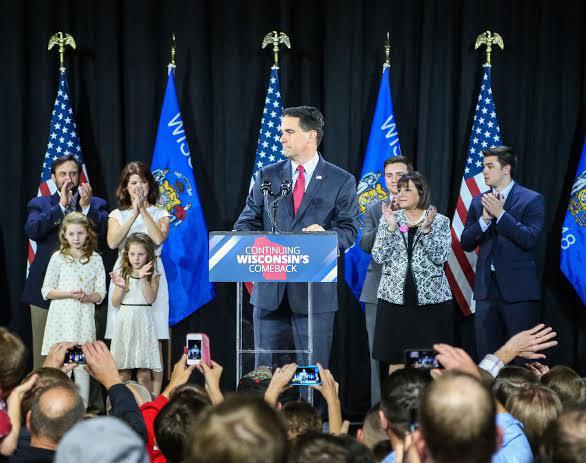Post-election discussions in Wisconsin have centered around the potential for a presidential campaign from Gov. Scott Walker in 2016. During the first gubernatorial debate, Walker explicitly stated his intention of serving a full, four-year term as governor. It seemed doubtful then and it seems doubtful now. By almost all accounts, Walker is eyeing a presidential run in 2016.
Some preliminary factors to consider: Walker has no foreign policy credentials, which could be an uphill battle, depending on the Democratic nominee. Furthermore, his lack of a college degree will pose a problem. This is not some petty insult, it is a serious shortcoming in his presidential qualifications. The last president without a college diploma (Harry Truman) was in office decades before Walker was even born. Though if we continue examining historical trends, governors have been all the rage (five of last seven presidents) since Jimmy Carter’s presidency in 1976.
I talked to University of Wisconsin professor David Canon, chair of the Political Science Department, and he summed up Walker’s chances pretty well. He said Walker’s lack of bipartisanship (which some may interpret as anti-bipartisanship) will be tough to sell to a national electorate. Also, the currently sidelined John Doe investigation could impose significant public image hurdles for Walker in the future. Canon continued by acknowledging that Walker has support of “big money” interests from across the nation (though this goes against his commonly used pro-Wisconsin, anti-outside-interests rhetoric), which is certainly crucial to a campaign. More importantly though, Walker has demonstrated a strong resilience for conservative policies.
Given Walker’s historically strong right-wing positions, it is hard to imagine him distancing himself from those preferences as a national executive. This is conjecture, but I would be shocked if Walker, a strict defender of defined sovereignty, moved left in any areas of foreign policy and illegal immigration. In Wisconsin, he has built an ideologically strong conservative resume – as an anti-labor, blanket anti-abortion, anti-same-sex marriage, anti-marijuana, anti-minimum wage increases and anti-Obamacare governor. As ideological divides seemingly continue to increase, this strong history certainly can appeal to the far right of the nation.
Party primaries typically feature these far right constituents, which puts Walker at an advantage against slightly (and I mean slightly) more moderate likely candidates, such as New Jersey Gov. Chris Christie or former Florida Gov. Jeb Bush. Though, if Walker were to hypothetically win the GOP primary in 2016, the Republicans would struggle much more in the general election.
Walker’s support will stop precisely where right-wing voters meet moderates. It is true that Walker likely had more independent votes than Mary Burke in the gubernatorial election, but remember these are self-identified independents, meaning their policy preferences, if classified by an objective definition, may mark them as conservative.
Moreover, Wisconsin perceives Walker as a capable, autonomous executive, one that can keep government moving. Given the frustrating gridlock in Washington (which Walker has wisely distanced himself from), this makes Walker’s ability to “get things done” rather appealing. Though, he has always benefited from a Republican majority in both the state Senate and Assembly. Historic trends tells us that the current Republican Congress (or conversely, a hypothetical Democratic Congress), may not persist past one, two-year term. We have certainly seen Walker’s ability to enact strong conservative legislation, but we have yet to see any indication of his willingness or capability of bipartisanship.
Finally, selling Wisconsin’s progress to moderates and leftists will be tough. Increasingly, the nation supports same-sex marriage, legalization of marijuana and raising the minimum wage, policies Walker has explicitly rejected. Moreover, Wisconsin’s prosperity, objectively speaking, is far from impressive. With a potential $2.2 billion budget shortfall looming and inadequate job growth, Walker is hoping for a turnaround before he ventures into Iowa and New Hampshire.
We have arrived at my conclusion (or delusion, depending where you stand). Pragmatically, Walker would make a mediocre presidential candidate, though he holds great potential to be an influential vice presidential candidate. His populist aura, combined with his Tea Party tendencies could complement a more moderate Republican candidate who appeals to voters willing to defect from the Democrats. In many ways, a vice-presidential candidacy highlights Walkers political strengths and blunts his shortcomings.
With no foreign policy experience at any level, Walker would have to follow in President Barack Obama’s example in choosing a running mate that can supplement this weakness. A commander-in-chief with strong foreign policy credentials, and Walker as his or her right-hand man, would be much more beneficial to Republicans than if the roles were reversed. More frankly, Walker does not have the oratory skills of a presidential candidate, though I hear some guy named Bush never let that stop him.
A storyline for a Walker presidential campaign certainly exists, but for Republicans hoping to win the White House, it may not be the best option. His lack of bipartisanship, strong conservative ideals and insufficient experience will not swing any votes with Independents or Democrats. That’s not to say the far right would not be ecstatic to vote for him — but that exemplifies why he is better fit for the vice presidential role.
Omer Arain ([email protected]) is a sophomore majoring in political analysis and research and economics.














